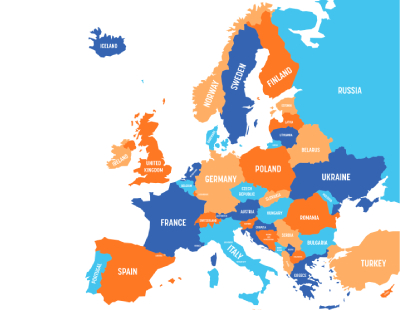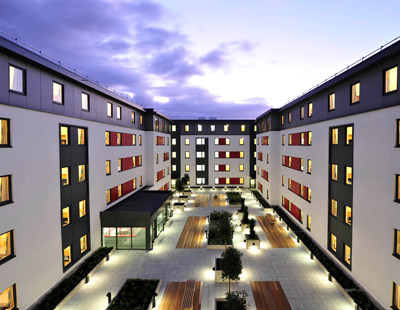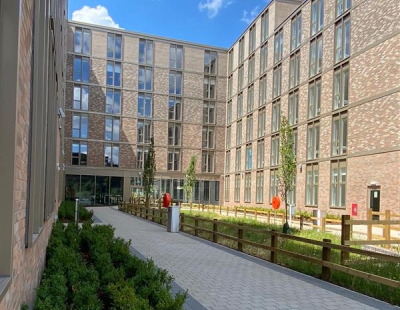Whilst not unaffected by coronavirus, PBSA in particular still has a great future in Central and Eastern Europe for two key reasons.
First, PBSA remains attractive to students because it offers the chance of independence in desirable settings where new relationships can be formed (even when having to do that in a socially distant way).
Secondly, PBSA in Central and Eastern Europe is still a new sector, and the market is far from saturated. Our experience shows that demand for 2020/21 remains stable, clearly showing the appeal of PBSA in the Covid-19 age.
The pre-Covid-19 student experience will persevere
When seeking to understand the student perspective and experience, it shouldn’t be forgotten that – far from sending everyone home – many European universities have allowed students to self-isolate in student accommodation.
This gives the lie to the idea that social distancing means you can’t live in a communal development... just think of the millions of people who live in apartment blocks all across Europe, who have had to self-isolate whilst still being in a communal setting.
Despite the need for lockdown measures, it is important that we remain part of a community, and try to mitigate instincts to hide away. Indeed, recent research has shown the mental health benefits of people still feeling a sense of community belonging whilst self-isolating. A recent study, published in scientific journal Brain, Behavior, and Immunity, found that social support and a sense of belonging served as protective factors against the psychological impact of Covid-19.
That said, the pandemic has led to unprecedented levels of remote working. With 68% of workers stating that they are more or equally as productive when working from home, according to a survey conducted by Visier, this could become the new normal.
This begs the question – could universities follow suit? The technology already exists for students to attend university remotely. Students can easily video-call into lectures and seminars, and course materials can be made available online.
Yet, attending university is more than just textbooks and lectures. It is, for most students, their first chance to live away from home. It teaches independence, and it widens horizons by placing students in a new town or city – or indeed in a new country, especially when learning a new language.
Those motivations have been strong enough to encourage plenty of students to move away from home for years, and will continue to attract new generations of students in the post-Covid-19 age.
Furthermore, students are typically in the very lowest risk band for Covid-19, and recognition of this should enable them to form wider bubbles in future outbreaks. The PBSA experience, with in-house amenities and self-contained rooms, allows for a safe and self-contained environment where young people can still engage and mingle with relative safety, whilst protecting those in the wider community.
Investing in an already undersaturated market
Covid-19 will of course have an effect on many asset classes, but the extent of this impact will vary significantly between them. To understand where this impact will be seen, we have to look at the underlying fundamentals.
In more developed and mature markets, where the yield value is greater, there may be adjustments. But in Poland, for example, PBSA is a relatively new sector, and it is already priced competitively.
Indeed, because the market is not oversaturated, demand remains unfulfilled. We estimate that PBSA in Poland is only catering for about 1.5% of students at universities in the country.
Moreover, in our case, PBSA is already at full occupancy, and with domestic and international demand remaining robust, there is an urgent need for increased supply. With Poland’s international student population growing by as much as 10% each year, students arriving from overseas alone could outnumber available PBSA beds by 2024, although this will of course depend on Covid-19 confidence.
That also fails to consider the fact that in Central and Eastern Europe, a lot of traditional university halls of residence are now coming to the end of their lifecycles.
The wants of occupants are changing, too – some 91% of students believe their place of study should actively incorporate and promote sustainable development, for example, according to UNESCO – and students will undoubtedly want their living spaces to reflect this.
Covid-19 will cause disruption, but at this moment PBSA continues to make sense from an investment perspective in many Central and Eastern European markets.
Enabling safe communal living
The pandemic has raised new concerns about co-living spaces such as university accommodation, but the answer isn’t to abandon the idea of communal living. Instead, as I have always believed, good design must sit at the heart of new developments.
When building for this new era, with the possibility of further lockdowns and increased social distancing, we must ask questions such as these: are there enough windows and access to natural light? Are there outside spaces that allow safe communication between individual rooms? Can occupants enter and exit the building from multiple points to reduce congestion at entry points?
Universities will reopen, international travel will return, and normal life will eventually resume. Now isn’t the time to shun university accommodation, but the time to innovate, improve, and ensure that PBSA is suitable and plentiful for the next wave of university students.
*John Harcourt is Managing Director at Kajima Properties (Europe).









.png)










Join the conversation
Be the first to comment (please use the comment box below)
Please login to comment